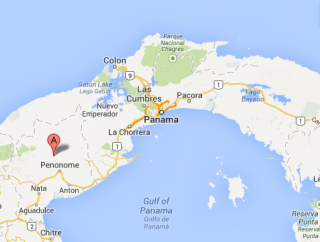Las Minas, Panama
![]()
![]()
![]()
![]()
![]()
![]()
![]() Click on Programs to learn more about their work in this community
Click on Programs to learn more about their work in this community
General Information
| Population* | 600 |
| Number of homes | 160 |
| Avg # of people per home | 3.75 |
| Electricity | Yes |
| Corregimiento | Tulu |
| District | Penonome |
| Corresponding Health Center | La Pintada |
| Distance from compounds | |
| Road conditions | Poor |
* Population does not reflect how many patients will be seen on medical
brigades as many people from surrounding communities come seeking
Medical Brigades medical attention.
Expressed Needs and Capacities
The community of Las Minas has an established water committee as well as a parent-teacher association. Areas in which the community would like improve include building a bathroom system for the elementary school, improving the condition of the highway near the community, as well as increasing agricultural projects such as a school garden.
Las Minas has a primary school, with classes for students grades kindergarten - 6. About 100 students attend this school, which is run by four teachers. The school consists of five classrooms, a kitchen and lunchroom. A parent-teacher association works at the school as well.
A gravity aqueduct and a turbine aqueduct provide the water for the community of Las Minas. Water is almost always available in this community. However, the system frequently needs repairs and those repairs can be very costly. 93% of the families in the community are connected to the water system, which costs $3.00/month. All the families that are connected pay the fee each month. The families do not chlorinate their water.
Las Minas does not have its own health center or post. The closest health center is located in La Pintada, 15 minutes away by bus. Almost no families in the community have flushing toilets, and 10% lack cement floors. Nearly all the families have stoves in their homes. The most common illnesses reported by the community are the common cold and fever.
The most common forms of employment amongst the men in this community are agriculture and cattle-raising. Crops raised in the community include yuca, rice, corn and plantains. The women usually take care of the home and also make and sell traditional crafts. The community members currently have access to the National Bank for savings.
No official waste management system is in place in Las Minas. Currently, the families burn their trash to dispose of it. There are no reforestation projects in place, nor does the community have an environmental committee at this time.
Although legal assistance is available to Las Minas from in the city of Penonome, currently no communities are seeking legal resources.
Source of information: Key informant interview
Date of interview: January, 2014
